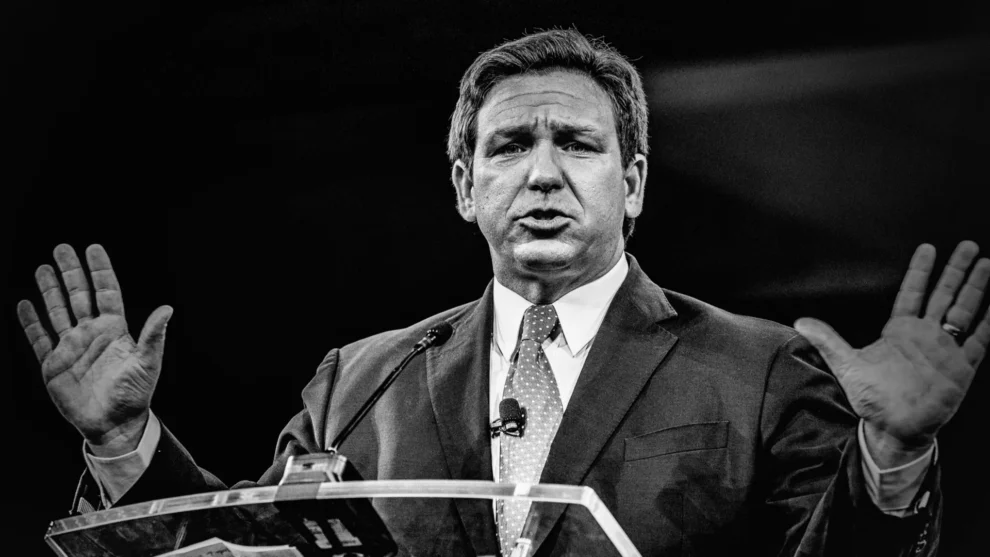The brutal war in Ukraine has shortened the distance across the Atlantic as Washington and Brussels have joined forces in opposing Russia and expanding NATO. The global battle between democracies and autocracies has united Western Europe and America.
Blue America, anyway. The candidates leading the pack of Republican presidential contenders tell a very different story in which the contest between democracies and autocracies is a myth; Ukraine, a sideshow. According to Donald Trump and Ron DeSantis, the existential battle for national security is playing out in Mexico and the Western Hemisphere.
If the White House changes hands in 2025, brace for a reset that shifts the focus of our foreign policy from the Atlantic to the Americas.
Republicans are playing to their nationalist “America First” base but also capitalizing on a real Biden administration weakness. The president has had more success uniting our European allies than he has responding to the drug or migration crises raging closer to home.
It’s not that the administration has pursued bad policies in the Western Hemisphere. But it has invested far less high-level attention and resources in the Americas than in Europe. And many Americans see the foreign policy issues closest to home as affecting their lives most directly. The Republican candidates know this.
“No Americans killed by Russia. Hundreds of thousands killed by Mexico. But Mexico is our ally and Russia is our enemy. How does that work?” So former Fox News host Tucker Carlson asked South Carolina Sen. Tim Scott, one of the few GOP hopefuls who supports Ukraine wholeheartedly. Carlson was referring to the scourge of fentanyl produced largely by Mexican cartels, which claimed a record toll of more than 109,000 Americans last year.
All the leading Republican candidates give deadly drugs top billing and pin the blame on Mexico. And all have endorsed targeting cartels on Mexican soil whether the country’s government likes it or not.
That reflects the views of Republican voters, most of whom see immigration, terrorism and drug trafficking as top foreign policy challenges. Fewer than 1 in 5 Republicans put Russia’s invasion of Ukraine in the same category.
A new GOP-led foreign policy would go beyond Mexican drugs in focusing on the “Americas First.” The Republican front-runners have advocated reviving Trump-era “safe third country” agreements, leveraging U.S. might to pressure South and Central American countries into accepting migrants prevented from reaching the border. Stiffening sanctions against the nominally socialist dictatorships of Cuba and Venezuela, always a priority for an influential subset of Republican voters in South Florida, also ranks high on the Trump and DeSantis agendas — never mind that Trump’s “maximum pressure” strategy left Venezuela’s tyrannical regime even more entrenched.
For his part, Biden made big promises on the campaign trail about tackling the root causes of migration from Central America, pursuing a more effective approach to Venezuela’s stubborn autocrat and helping “democracy deliver” in the Americas. But the factors driving migration in Central America haven’t changed much, Nicolás Maduro is as firmly in control as ever, and many democracies in the region are floundering.
“I struggle to see what this administration is doing in Latin America that has any heft to it,” one disgruntled senator said last month. Remarkably, it was a Biden ally, Virginia Democrat Tim Kaine.
Crises in Afghanistan and Ukraine understandably forced the administration to shift away from Latin America. The trouble is that it never shifted back. The administration’s well-meaning economic agenda for the region, announced last year, has yet to take off, and Latin America’s COVID-battered economies get relatively little U.S. assistance.
True, the administration can claim achievements in the Americas. Its quiet diplomacy helped secure a democratic exit from 10 years of quasi-authoritarian rule in Honduras and thwart election deniers in Brazil and Guatemala. The administration also brokered the Los Angeles Declaration, a regionwide effort to manage migration.
But the Biden administration’s policies still look like short-term crisis management, often with a single bottom line: reducing migration. The inattention shows. Biden has made 14 international trips to 21 countries as president but stopped in Latin America just once for about 48 hours.
That’s not to say Republicans’ proposals will effectively address the Western Hemisphere’s crises. In many ways, they would court disaster.
Mexico, America’s top trading partner, roundly rejects the idea of a U.S. counterterrorism operation on its soil. Such an intervention could strain bilateral ties at a huge economic cost to ordinary Americans.
And no amount of deterrence, however brutal, will stop migration. It will only make the path to the United States longer and more lucrative for criminals and profiteers who take advantage of migrants. Nor will bullying bring Latin American governments into alignment with Washington. While you wouldn’t know it from the Republican candidates’ stump speeches, the United States is no longer the hemisphere’s all-powerful hegemon.
That said, it seems the xenophobic America First crowd ironically boasts more friends than Biden among Latin America’s leaders. Florida Sen. Marco Rubio recently rubbed elbows with El Salvador’s iron-fisted president, Nayib Bukele. Members of Trump’s inner circle forged a bond with former Brazilian President Jaír Bolsonaro’s. And Trump’s first indictment led a chorus of Latin American presidents to allege that Biden is politicizing law enforcement. The GOP might be laughed out of the room in Brussels, but Latin America’s capitals have plenty of politicians who share its economically nationalist, socially conservative impulses.
Democrats and Republicans increasingly live in different worlds, so perhaps it’s not surprising that they’re articulating such divergent foreign policies. But adopting a measure of Republicans’ focus on Latin America, if not their ideas, could boost the Biden administration’s fortunes among voters who think America’s greatest foreign policy concerns are close to home.
Source: Yahoo News









